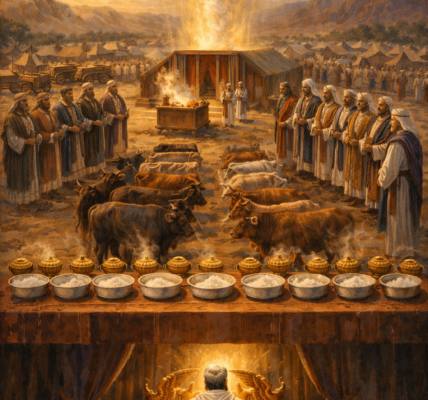**The Collection for the Saints: A Story of Generosity and Faithfulness**
The sun hung low over the city of Corinth, casting golden rays across the marble colonnades and bustling marketplaces. The air was thick with the scent of spices, the murmur of merchants, and the distant sound of waves lapping against the harbor. In a modest home near the heart of the city, a group of believers gathered, their faces alight with anticipation. They had received a letter from Paul, their beloved teacher, and today it would be read aloud.
Tychicus, a trusted messenger, stood before them, carefully unrolling the scroll. The room fell silent as he began to read the final words of Paul’s first letter to the Corinthians.
*”Now concerning the collection for the saints: as I directed the churches of Galatia, so you also are to do.”*
A murmur spread through the room. The collection for the suffering believers in Jerusalem had been on Paul’s heart for some time. The church in Judea was enduring severe persecution, and many were in desperate need.
*”On the first day of every week, each of you is to put something aside and store it up, as he may prosper, so that there will be no collecting when I come.”*
Erastus, a city official and a devoted follower of Christ, leaned forward. “This is a matter of discipline,” he said thoughtfully. “Not just giving when the need arises, but setting aside our gifts regularly, as an act of worship.”
Priscilla, seated beside her husband Aquila, nodded in agreement. “It is as the Proverbs say—the wise store up, but the foolish spend all at once. This way, when Paul arrives, the gift will be ready, and none will be burdened with haste.”
The believers exchanged glances, some already calculating what they could give. A wealthy merchant named Stephanos thought of his recent profits, while Lydia, a seller of purple cloth, considered the finest of her goods. Even those with little—like the freed slave Onesimus—determined in their hearts to contribute what they could.
Tychicus continued reading: *”And when I arrive, I will send those whom you accredit by letter to carry your gift to Jerusalem. If it seems advisable that I should go also, they will accompany me.”*
A ripple of excitement passed through the group. The idea that Paul himself might come to Corinth again filled them with joy. Yet they also understood the gravity of the mission—this was no mere delivery of goods, but a sacred offering, a tangible expression of love across distant churches bound together in Christ.
As the meeting drew to a close, the believers dispersed with a renewed sense of purpose. In the days that followed, the homes and workshops of Corinth’s Christians became places of quiet sacrifice. Coins were set aside in clay jars, grain was measured and stored, and prayers were whispered over each offering.
Meanwhile, Paul’s letter also spoke of his plans—his hope to stay in Ephesus until Pentecost, his intent to visit them after passing through Macedonia. He wrote of Timothy’s impending arrival, urging them to receive the young disciple with kindness and without fear, for he labored in the Lord’s work just as Paul did.
And then, the final exhortation: *”Be watchful, stand firm in the faith, act like men, be strong. Let all that you do be done in love.”*
These words lingered in the hearts of the Corinthians as they prepared their gifts. The collection was more than an act of charity—it was a testament to their unity, their faithfulness, and their unwavering love for the brethren in Jerusalem.
And so, week by week, the treasure grew—not just in coins and goods, but in the quiet obedience of a people who understood that true generosity flows from a heart transformed by Christ.
When the time finally came, and the appointed messengers set out for Jerusalem with the Corinthians’ offering, it was not merely a delivery of aid—it was a sacred procession, a living testimony of the grace that binds the saints together across lands and trials.
For in giving, they had received far more. And in loving the distant brethren, they had drawn nearer to the heart of God.




